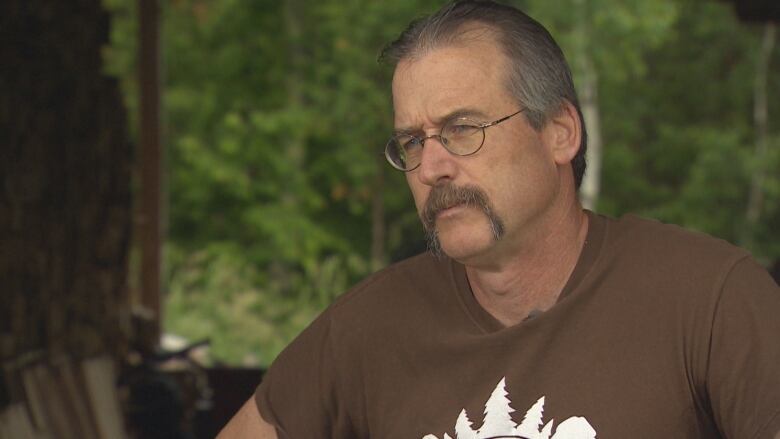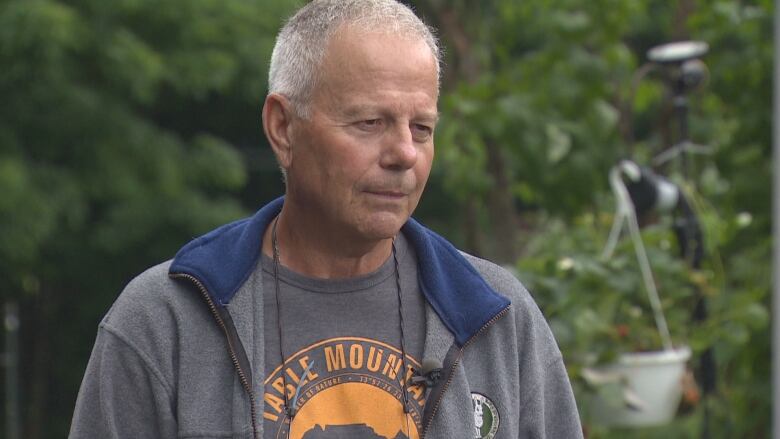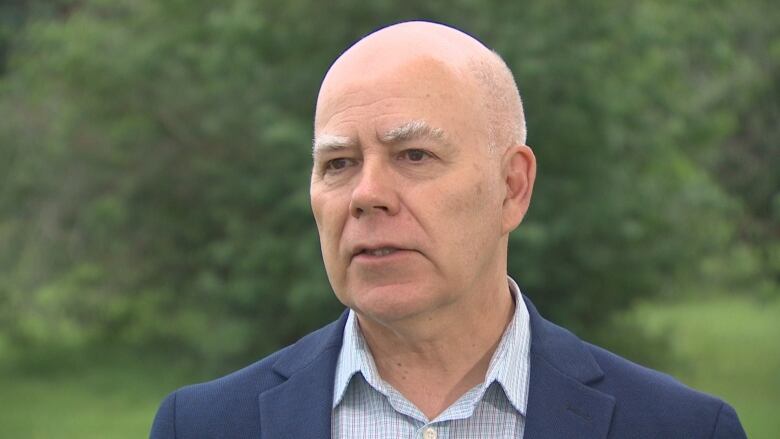Fired college instructor's views on glyphosate at root of dismissal, says former colleague
Rod Cumberland was fired from the Maritime College of Forest Technology on June 20

Rod Cumberland, a well-knownwildlife biologist, has been fired from his teaching post at the Maritime College of Forest Technology in Fredericton.
A letter from the college outlined multiple reasons for his dismissal on June 20, but a former employee believes Cumberland's outspokenness against glyphosate, a controversial herbicide used by the New Brunswick forest industry, was a factor.
"All I know is I was there and now I'm not, and that's probably the most factual thing I can say right now," Cumberland told CBC News.
Among the accusations against Cumberland listed inthe letter are that he prevented students from attending his class because they were late, insisted that theyremove their hats in class, and madedisparaging remarks in the community about the college, its director and some fellow instructors.
The letter also said he engaged "in communication and a course of conduct, both at MCFT and in the community at large, that constitutes harassment and has caused embarrassment and damage to the reputation of MCFT."
Cumberland said he was surprised by the decision to fire him and is unclear on the college's reasoning.
"It doesn't make sense when you look at it on the surface," he said.
Thedeer biologist and competitive lumberjack has spent 29 years working for the provincial Department of Natural Resources and the Fredericton-based ranger school.
After leaving government, he began publicly discussing the effects of the herbicide glyphosate on New Brunswick's forests and, in particular, the deer population.
I knew that Rod was vulnerable.- Gerald Redmond, college's former executive director
The college, originally called the Maritime Forest Ranger School,was established as a co-operative venture of the New Brunswick and Nova Scotia governments and forest industries, according to the college's website.
Its Fredericton campus is on the grounds of the Hugh John FlemmingForestry Centre, also a co-operative venture of government agencies,educational institutions and industry associations.
Deterring students
The dismissal letter said Cumberland undermined the content of avegetation management seminar approved by thecollege.
Cumberland said he was accused of deterring students from attending the seminar, adding that was never the case.

"I encouraged them to look at all the science," he said, "and encouraged them to even critique me. Look at what I'm saying, see if it's true or not. I think that's a wise thing to do [for] anything in life. Get all the facts before you make a decision."
Gerald Redmond, the college's former executive director who retired in 2017, said he was pressured during his tenure to reprimand Cumberland.
He said Cumberland's outspokenness against glyphosate is probably the "real reason" why he was fired.
"I knew that Rod was vulnerable," said Redmond, who hired Cumberland twice once in government and again at the college.

"Because even when I was the executive director, I felt pressure from the board of governors in several instances, to try to sanction Rod for his outspokenness on the glyphosate herbicide."
Redmond said the forest industry does not like what Cumberland says on the issue. He said he should be reinstated.
Statement from the board
The college's board of governors responded to an interview request with a statement Wednesday afternoon that said it will not comment on personnel issues, while reaffirming support for current executive director Tim Marshall.
The board also said it's aware of Redmond's views, saying he "was not involved in the decision in question nor was he privy to the information that led to the decision."
Green Party Leader David Coon said the Department of Post-secondary Education, Training and Labour should launch an internal inquiry into the matter and make the results public.
He said it's another instance in which an institution is not standing up to the "powers that be" meaning government and the forestry sector, he said. It's not the first time that action has been taken against a scientist who has been outspoken about forestry industry practices, he said.

"It's clear to me that his dissent is the problem," Coon said.
Redmond also created a private Facebook Group called Friends of "Rod Cumberland" in support of his former colleague. Many graduates posted to the group, calling the firing "outrageous" and questioning the real reasons behind it.
The posts said Cumberland was a teacher who promoted a good work ethic, discipline and punctuality and that he was an ethical, thoughtful and caring instructor.
'Court cases being won'
Cumberland said modern, independent studies on glyphosate are producing more evidence that the product can be harmful to animals, including humans. In 2015, the World Health Organization classified the herbicide as "probably carcinogenic to humans."
"There are court cases being won all across North American right now based on a lot of evidence, and I think that evidence speaks for itself," he said.
Bayer, which purchased glyphosate-producer Monsanto, was ordered by a Californian jury in May to pay $2 billion in damages to a couple who alleged the herbicide gave them cancer.
Plaintiffs in two other Californian cases were awarded tens of millions of dollars in damages. The company disputesthe allegations that the product can be linked to cancer and is appealing the decisions.
The product is banned in several areas across the globe, including on Crown land in Quebec.

In Canada, separate class-action lawsuits against Bayer and Monsanto have been launched in Saskatchewan and Quebec.
Health Canada says glyphosate is "not genotoxic and is unlikely to pose a human cancer risk."
The New Brunswick government announced a reduction in herbicide spraying earlier this year.
With files from Catherine Harrop













_(720p).jpg)


 OFFICIAL HD MUSIC VIDEO.jpg)
.jpg)



























































































